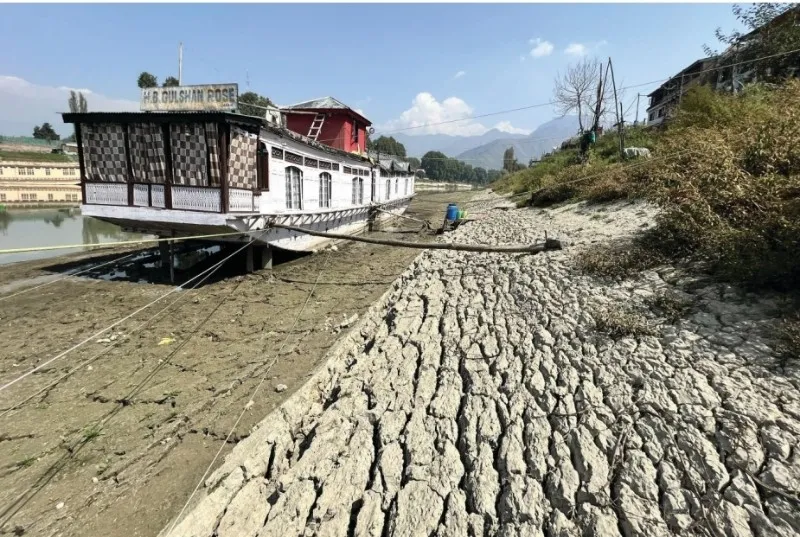Kashmir, known for its breathtaking beauty and lush landscapes, has long been a symbol of nature’s splendour. However, the region’s fragile ecosystem has been under severe threat due to climate change in recent years. The Himalayas, which dominate the landscape of Kashmir, are feeling the heat of global warming, with rising temperatures and shifting weather patterns altering the environment at an alarming pace. This article explores the impact of climate change on Kashmir’s ecosystem, the consequences for its biodiversity and people, and the steps that can be taken to preserve this delicate region.
Kashmir’s climate has traditionally been cold and temperate, with heavy snowfall in the winters and mild summers. However, rising temperatures have reduced snowfall, especially in the higher reaches of the mountains, and increased rainfall. This has affected the region’s water sources, including rivers, lakes, and glaciers. The glaciers, which act as a natural reservoir, are retreating rapidly, leaving many regions dependent on them vulnerable to water shortages.The retreat of glaciers is one of the most visible signs of climate change in Kashmir. Many glaciers, such as the Kolahoi Glacier, which feeds the Jhelum River, have shrunk drastically.
This has led to a reduction in water flow during the crucial summer months when the demand for water is high. Without adequate water resources, agriculture, which is a primary livelihood for many people in the region, is increasingly at risk. Crops like rice, apples, and saffron, which are integral to the local economy, are suffering from erratic rainfall patterns and rising temperatures. In addition to this, the changing climate is also affecting the region’s biodiversity. Kashmir is home to a diverse range of flora and fauna, including rare species like the Hangul deer and the Kashmiri stag. With changing weather patterns, these species are losing their natural habitats and facing increasing pressure from human activities. Forests are becoming more prone to wildfires, which further degrade the environment.
The impact of climate change in Kashmir is not just environmental but also socio-economic. The agricultural sector, which employs a large portion of the population, is facing severe disruptions. The unpredictable weather makes farming more difficult, leading to crop failures and reduced yields. As a result, farmers are becoming economically insecure, and food prices are rising. Additionally, communities that depend on the lakes and rivers for fishing and water supply are also facing difficulties as these resources become scarce. Increased flooding due to changing rainfall patterns and the melting of glaciers has also contributed to displacement, damaging homes and infrastructure. The impacts of climate change are, therefore, not only ecological but also deeply affecting the day-to-day lives of people in Kashmir.
While the challenges are significant, there are several ways to mitigate the effects of climate change and protect Kashmir’s fragile ecosystem.Sustainable Water Management: Efficient water management systems should be developed to address the diminishing water sources. This cludes promoting rainwater harvesting, the construction of small water storage systems, and better management of existing water bodies. Protecting and rejuvenating the glaciers should also be a priority to ensure a stable water supply.Afforestation and Reforestation: The government and local communities should focus on afforestation and reforestation programs to restore the damaged forests. Planting more trees will help to reduce soil erosion, prevent floods, and absorb carbon dioxide from the atmosphere, thereby improving the climate. Additionally, the protection of existing forests from illegal logging is crucial for maintaining ecological balance.
Promotion of Climate-Resilient Agriculture: Agricultural practices should adapt to the changing climate. Introducing drought-resistant crops and promoting organic farming practices can help increase food security. Farmers can also be trained in water-efficient irrigation techniques, such as drip irrigation, to reduce water wastage.Green Infrastructure Development: Investment in green infrastructure, such as eco-friendly buildings and renewable energy sources like solar and wind, can help reduce carbon emissions in the region. Encouraging the use of clean energy will also reduce reliance on fossil fuels and help mitigate climate change.Climate Change Awareness and Education: It is essential to raise awareness about the importance of protecting the environment among the local population. Educating communities about sustainable practices, waste management, and climate change impacts will empower people to take proactive steps in conservation.
Kashmir’s ecosystem is at a crossroads, facing significant challenges from climate change. The region’s glaciers, forests, and agricultural systems are all vulnerable to the effects of rising temperatures and shifting weather patterns. However, through concerted efforts in sustainable water management, afforestation, climate-resilient agriculture, and clean energy development, it is possible to safeguard the environment for future generations. The people of Kashmir, with support from the government and the global community, can take steps to adapt to and mitigate the effects of climate change, preserving the natural beauty and resources that have made the region so unique.


